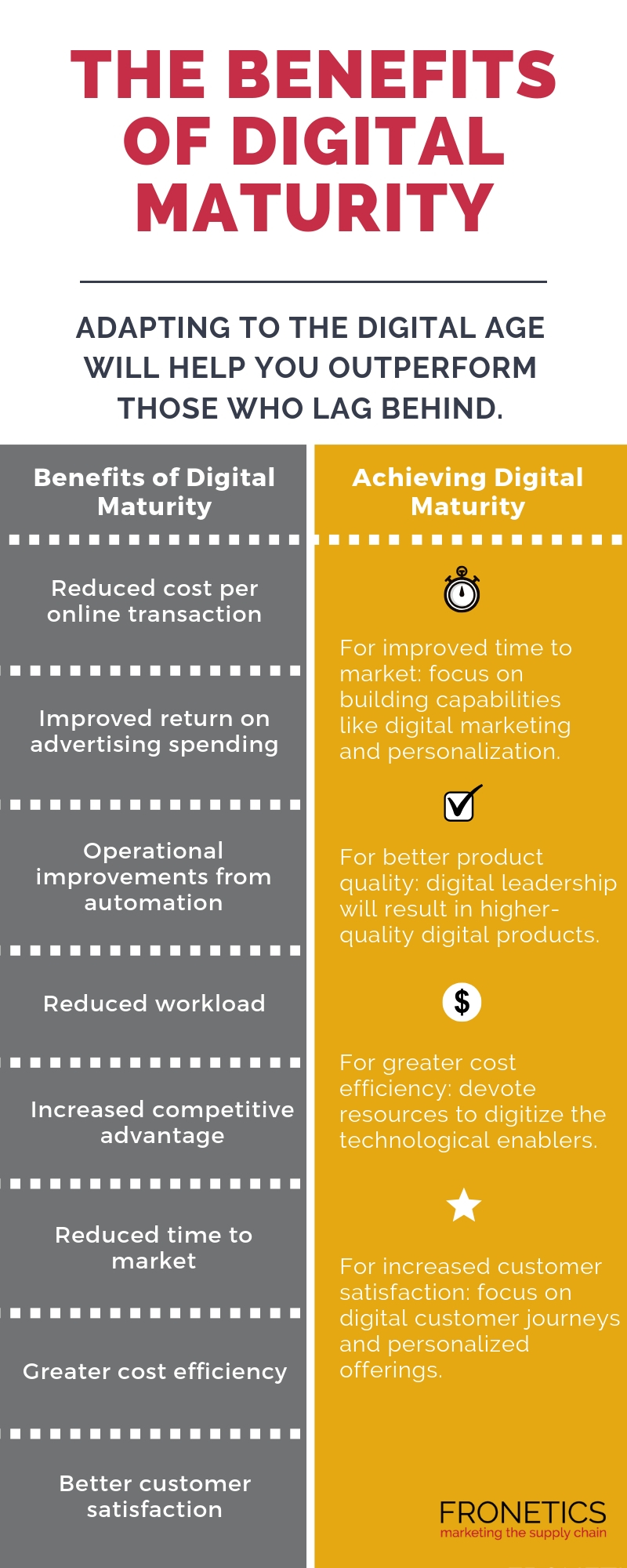
Infographic: The Beneifts of Digital Maturity
As the performance gap between high and low digitally achieving companies widens, taking steps toward digital maturity is increasingly important.
Highlights:
- Increasingly, digital maturity is a predictor of overall market success.
- Benefits include reduced costs and time to market and improved product quality and customer satisfaction.
- Companies at any stage of digital maturity can take steps to improve.
Digital maturity, or the process of a company’s learning to respond appropriately to the emerging digitally competitive environment, is increasingly accounting for a widening performance gap among B2B businesses. And the gap will continue to widen: Companies who are adapting well to the digital age will increasingly outperform those who lag behind.
Boston Consulting Group’s second annual survey of nearly 2,000 companies in the United States and Europe found that while 25% of the companies surveyed qualified as “digital champions,” nearly one-third are significantly behind in their digital maturity. The study found that “increased levels of digital maturity significantly improved competitive advantage along multiple performance indicators, such as time to market, cost efficiency, product quality, and customer satisfaction.”
BCG’s study used the company’s respected Digital Acceleration Index (DAI) to make comparisons among companies. And it offers some hopeful takeaways for businesses at any point on the spectrum. For example, “an increase in digital maturity of 25 DAI points improves the likelihood of reaching a superior performance for time to market, and cost efficiency doubles.”
These are powerful numbers. And BCG also points out that very few companies have achieved full digital marketing maturity — which means that essentially everyone should be taking note. Our infographic below looks at why digital maturity is important, and how companies can take steps toward achieving it.
The benefits of digital maturity

BCG’s study aimed to quantify the value of improving digital maturity to impressive results. Some of the most significant benefits the study found were:
- Reduced cost-per-action in online transactions
- Increased online transactions
- Improved return on advertising spending
- Operational improvements from automation
- Reduced workload
- Increased competitive advantage
- Reduced time to market
- Greater cost efficiency
- Improved product quality
- Better customer satisfaction
Achieving digital maturity
No matter where they are in the process of achieving digital maturity, companies can improve and accelerate their progress. In particular, companies should focus their efforts to reap the benefits of digital marketing maturity:
- For improved time to market: Focus on building capabilities like digital marketing and personalization.
- For greater cost efficiency: Devote resources to digitize the technological enablers, such as increased automation in everything from production to marketing.
- For better product quality: Digital leadership is key. Fostering a strong digital culture company-wide and investing in digital talent will result in higher-quality digital products.
- For increased customer satisfaction: Focus on digital customer journeys and personalized offerings.
The bottom line
Digital maturity will increasingly separate the herd. Digital drives performance across B2B industries. It’s time for the supply chain to stop looking at technology as a cost center and start seeing it as a profit driver and competitive advantage in the market.
Related posts:

